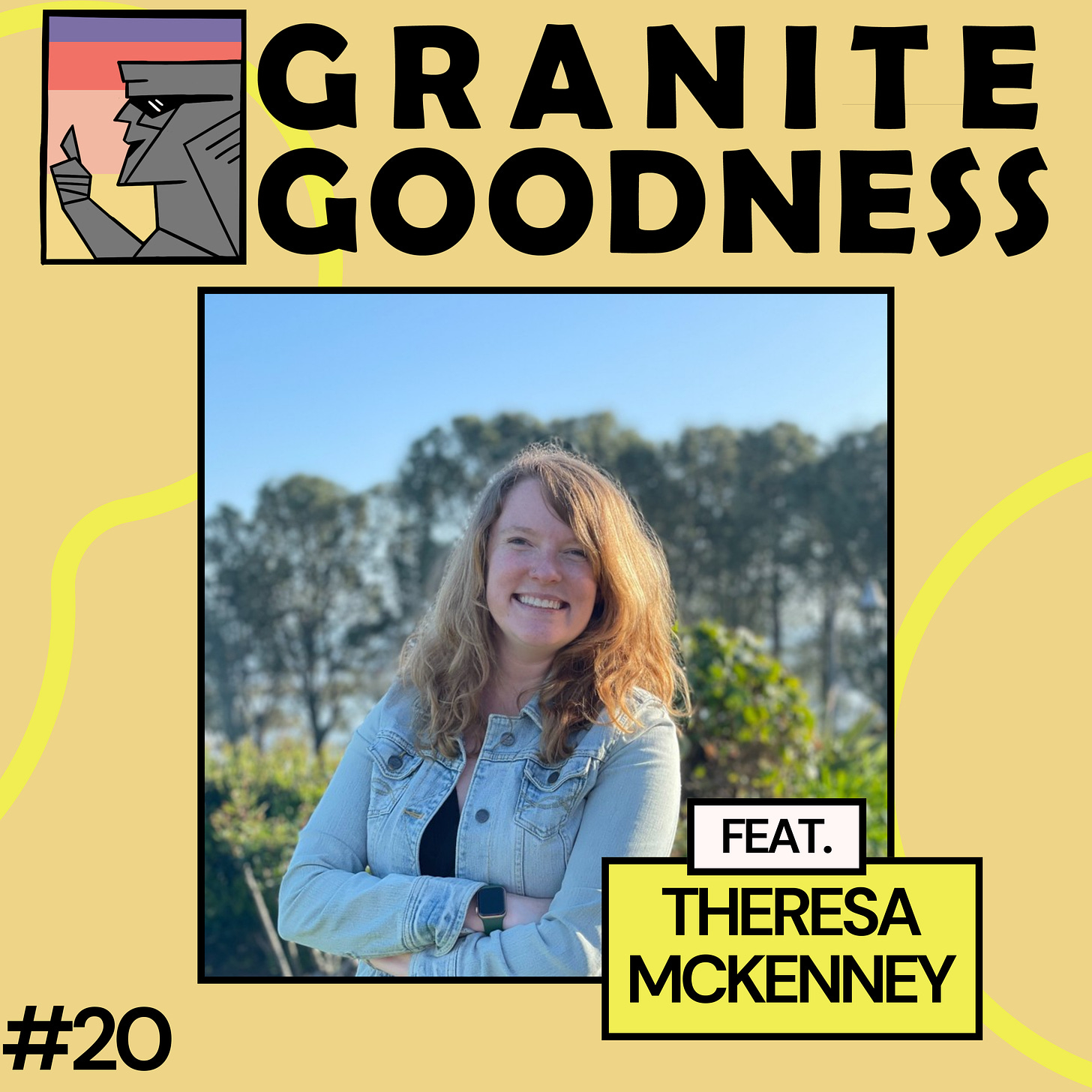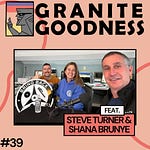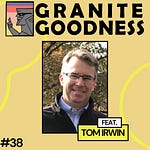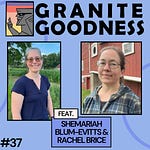On episode 20 of Granite Goodness, Andy learns about the unlikely and charming thread that connect Captain Nemo, cutting edge sustainability innovation, fiddle camp, outdoor adventures, and regulation. It’s Theresa McKenney. The two discuss:
The importance of NH’s outdoor recreation economy
Why human rights matters to sustainability
How regulation can make or break your bottom line
Being a serial “starter”, and convener of interesting people doing cool things outside
Theresa’s formative experiences at fiddle camp
The history of sustainability innovations
Why community matters in contra dance, music, and the outdoor recreation industry
and more!
Theresa McKenney is the Head of Sustainability & Government Affairs at NEMO Equipment, a world leader in manufacturing sustainably sourced outdoor adventure gear.
Links & Notes:
Music provided by Sneaky Miles
This episode was recorded in Treeline Outfitters
To learn more about us or read our Good News in New Hampshire Newsletter, go to granitegoodness.com
Instagram:
Linkedin:
AI Generated Episode Summary:
How did Theresa McKenney start her career, and what role did sourcing and supply chain management play in her path to sustainability?
Theresa McKenney began her career in sourcing and supply chain management, which provided her with a comprehensive understanding of the design process and product development. She gained valuable insights into how products are made and the collaboration needed across supply chains, particularly with factory partners. This experience laid the foundation for her current focus on sustainability, as she realized that sustainability starts with understanding how products are made. From there, she began exploring how to improve products by incorporating recycled materials and better managing chemical use.
What is Nemo Equipment, and how does the company integrate sustainability into its outdoor gear manufacturing?
Nemo Equipment, based in Dover, New Hampshire, manufactures outdoor adventure gear with a focus on sustainable sourcing. While it may not be as well-known as brands like Patagonia or The North Face, Nemo is recognized for its sustainable practices and commitment to reducing environmental impact. The brand focuses on innovative product development, using recycled materials and reducing harmful chemicals. Theresa emphasized that sustainability is not only about brand values but is also driven by regulatory demands and market expectations, with partners like REI pushing for greener products.
What is "Sustainabilibrews," and how did Theresa help co-found this sustainability networking group?
"Sustainabilibrews" is an informal networking group for sustainability professionals in the New Hampshire Seacoast region. Theresa co-founded the group with her friend Zach after they were handed the responsibility of organizing it. The group creates a casual space for people in sustainability to share experiences and ideas. Despite a pause during the pandemic, the group has since resumed, and Theresa enjoys its relaxed environment, where attendees can discuss sustainability challenges and successes openly.
How did Theresa’s time at the University of New Hampshire shape her career, and how did she transition into environmental conservation?
Theresa originally enrolled at the University of New Hampshire (UNH) as an anthropology major, inspired by the adventurous idea of being like Indiana Jones. However, her love for the outdoors led her to switch to environmental conservation studies, aligning her career with sustainability. This educational background, combined with her passion for outdoor recreation, set her on a path toward corporate sustainability, specifically in the outdoor gear industry. At the time, sustainability wasn’t as prominent as it is today, but now it’s a core component of business strategies in industries like outdoor recreation.
How has the concept of sustainability expanded over time, and what are the current challenges in managing sustainable supply chains?
Theresa noted that when she first entered the sustainability field, the focus was primarily on environmental stewardship. Today, sustainability encompasses a broader range of issues, including social responsibility, labor rights, and circularity. Managing sustainable supply chains has become more complex with laws like the Uyghur Forced Labor Protection Act, which require companies to have deep knowledge of their supply chains to avoid unethical practices. For Theresa, these regulatory demands highlight the importance of being proactive and transparent in sustainability efforts.
What role has Nemo Equipment played in eliminating harmful chemicals like PFAS, and how has this innovation shaped their products?
Nemo Equipment has made significant strides in eliminating harmful chemicals like PFAS (also known as "forever chemicals") from its products. With upcoming California regulations set to ban PFAS in textiles by 2025, Nemo worked ahead of the curve to develop alternatives. They created a water-repellent material free of PFAS, which not only meets regulatory standards but also enhances product performance. Theresa explained that Nemo’s PFAS-free Osmo tent fabric has become their best-performing fabric to date, showcasing how sustainability can lead to product innovation.
How did Theresa get involved in fiddle music, and what role does it play in her life today?
Theresa has been involved in the folk music and dance world since childhood, growing up with Scottish and Cape Breton traditions. After college, she reignited her love for fiddle music by attending the Boston Harbor Scottish Fiddle School, which became a pivotal moment in her musical journey. Since then, she has played in various fiddle ensembles and orchestras, including the New Hampshire Fiddle Ensemble and the Boston Scottish Fiddle Orchestra. Music, particularly fiddle playing and Contra dancing, has become an important part of her life, providing her with a creative outlet and a sense of community.
What is Theresa’s involvement in community music, and how does it relate to her love for social dancing?
Over the years, Theresa has played fiddle and piano for social dances like Contra dancing and Scottish country dancing. She enjoys the intergenerational community that these dances foster, where people of all ages come together to participate. Currently, she is working on starting a dance band, which aligns with her passion for traditional music. Theresa highlighted how the welcoming and inclusive nature of the folk music scene has allowed her to meet people from diverse backgrounds while preserving cultural traditions.
What is Theresa’s perspective on the future of sustainability in the outdoor industry, and what gives her optimism?
Theresa is optimistic about the future of sustainability because she sees the industry moving from discussions into action. She believes that both regulations and market demands are driving real change, pushing companies to implement sustainable practices. Whether it’s through eliminating harmful chemicals, ensuring ethical supply chains, or innovating new products, Theresa feels that sustainability is becoming a business imperative. She is excited to see more companies taking action rather than simply talking about sustainability.
How does Theresa’s work in sustainability intersect with her love for music, and what common themes connect the two?
Theresa sees a strong connection between her work in sustainability and her passion for music. Both involve building communities and fostering shared experiences. Whether she’s working to create sustainable products or playing fiddle at a Contra dance, she is driven by the idea of bringing people together for a common cause. Sustainability, much like traditional music, requires collaboration, creativity, and a commitment to long-term values. For Theresa, both aspects of her life are about creating a positive impact and enriching the world around her.
Full transcript on granitegoodness.com















Share this post